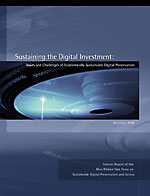News
Blue Ribbon Task Force Report: Economic Plans Needed to Preserve Valuable Digital Data
Published December 15, 2008
For Immediate Release
Media Contact:
Jan Zverina, SDSC Communications, (858) 534-5111 or
jzverina@sdsc.edu
There is no time to waste, according to the new report from the Blue Ribbon Task Force on Sustainable Digital Preservation and Access, launched by the National Science Foundation and the Andrew W. Mellon Foundation in partnership with the Library of Congress, the Joint Information Systems Committee of the United Kingdom, the Council on Library and Information Resources, and the National Archives and Records Administration.
A recent study by the International Data Corporation (IDC) said that in 2007, the amount of digital data began to exceed the amount of storage to retain it, and will continue to grow faster than storage capacity from here on. The IDC study predicts that by 2011, our "digital universe" - consisting of digitally-based text, video, images, music, etc. - will be 10 times the size it was in 2006.
Although not all of this data should be preserved, digital data within the public interest - digital official and historical documents, research data sets, YouTube videos of presidential addresses, etc. - must be retained to maintain an accurate and complete "digital record" of our society. Such digital information is now part of what is known as cyberinfrastructure, an organized aggregate of computers, networks, data, storage, software systems, and the experts who run them that is vital to our life and work in the Information Age.
"NSF and other organizations, both national and international, are funding research programs to address these technical and cyberinfrastructure issues," said Lucy Nowell, Program Director for the Office of Cyberinfrastructure at the National Science Foundation. "This is the only group I know of that is chartered to help us understand the economic issues surrounding sustainable repositories and identify candidate solutions."
While storage and technological issues have been at the forefront of the discussion on digital information, relatively little focus has been on the economic aspect of preserving vast amounts of digital data fundamental to the modern world.
"The long-term accessibility and use of valuable digital materials requires digital preservation activities that are economically sustainable - in other words, provisioned with sufficient funding and other resources on an ongoing basis to achieve their long-term goals," said Brian Lavoie, a co-chair of the task force and a research scientist with OCLC, an international library service and research organization headquartered in Dublin, Ohio. "Economically sustainable digital preservation is a necessary condition for securing the long-term future of our scholarly and cultural record."
"Access to data tomorrow requires decisions concerning preservation today," said Fran Berman, director of the San Diego Supercomputer Center at the University of California San Diego, and also a co-chair on the task force. "The Blue Ribbon Task Force's interim report represents a year of testimony and investigation into the economic models supporting current practice in digital preservation and access across sectors."
The interim report traces the contours of economically sustainable digital preservation, and identifies and explains the necessary conditions for achieving economic sustainability. The report also synthesizes current thinking on this topic, including testimony from 16 leading experts in digital preservation representing a variety of domains. In reviewing this synthesis, the task force identified a series of systemic challenges that create barriers to long-term, economically viable solutions. Some of these challenges include:
-
Inadequacy of funding models to address long-term access and preservation needs. Funding models for efforts that incorporate digital access and preservation are often not persistent - they may be "one time" efforts subsequently abandoned as more critical short-term priorities emerge.
-
Confusion and/or lack of alignment between stakeholders, roles, and responsibilities with respect to digital access and preservation. Often, those who create and use digital information are not responsible for serving as stewards to support preservation and access. Consequently, the costs may not be shared, which can lead to inadequate economic models for sustainability.
-
Inadequate institutional, enterprise, and/or community incentives to support the collaboration needed to reinforce sustainable economic models. Digital preservation and access require long-range planning and support, as well as agreement on formats, standards and use models, and hardware/software compatibility.
-
Complacency that current practices are "good enough." The urgency of developing sustainable economic models for digital information is not uniformly appreciated. There is general agreement that leadership and competitiveness, if not institutional survival, in the Information Age depends on the persistent availability of digital information, making preservation of that information an urgent priority.
- Fear that digital access and preservation is too big to take on. There is general agreement that in its entirety, digital preservation is a big problem, incorporating technical, economic, regulatory, policy, social, and other aspects. But it is not insurmountable. Digital access and preservation may be as manageable as including a "data bill" as an explicit and fixed part of an institution's business model. Successes depend on making sustainable digital access and preservation a persistent "line item" on the part of stakeholders.
Continuing its work for a second and final year, the Blue Ribbon Task Force on Sustainable Digital Preservation and Access will issue its final report in early 2010 proposing practical recommendations for sustainable economic models to support access and preservation for digital data in the public interest.
To view the complete BRTF-SDPA Interim Report, please see: http://brtf.sdsc.edu/biblio/BRTF_Interim_Report.pdf
For a complete list of BRTF-SDPA members, please see: http://brtf.sdsc.edu/members.html
Categories
Archive
Related Links
National Science Foundation: http://www.nsf.gov/
Andrew W. Mellon Foundation: http://www.mellon.org/
Council on Library and Information Resources: http://www.clir.org/
Joint Information Systems Committee of the United Kingdom: http://www.jisc.ac.uk/
Library of Congress: http://www.loc.gov/index.html
National Archives and Records Administration: http://www.archives.gov/
OCLC: http://www.oclc.org/
San Diego Supercomputer Center (SDSC): http://www.sdsc.edu/
###


